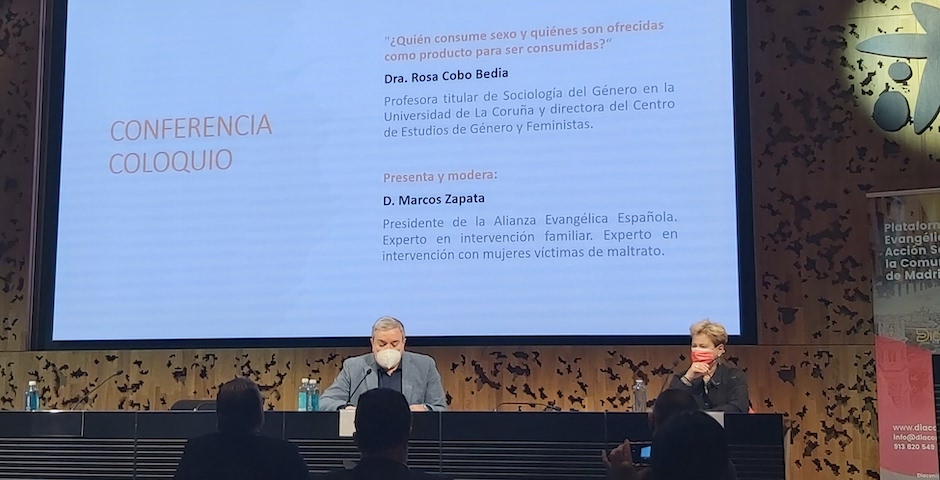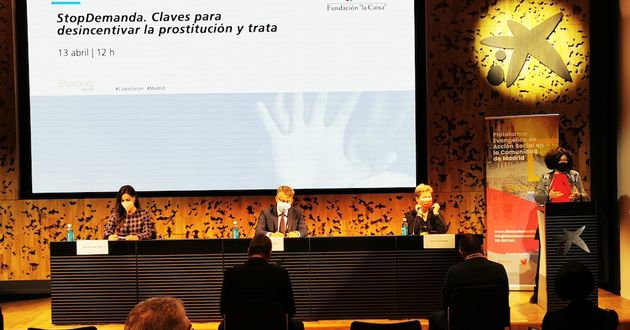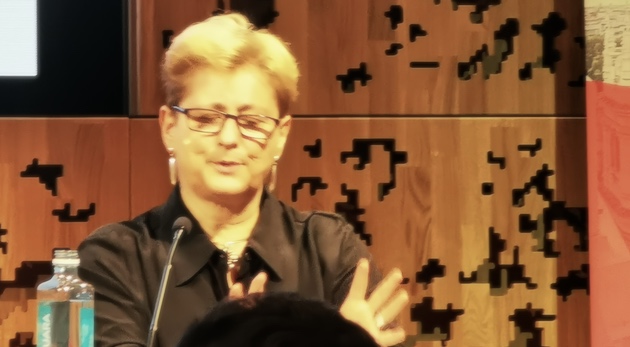An event held in Madrid shows the successes of the Nordic model, which punishes the client, to curb trafficking and prostitution.
 Marcos Zapata and Rosa Cobo during the event held in Madrid, / Jonatán Pozo, Diaconía.
Marcos Zapata and Rosa Cobo during the event held in Madrid, / Jonatán Pozo, Diaconía.
The social branch of the Evangelical Council of Madrid, Diaconia Madrid, opened the seminar “#StopDemand: keys to discourage the consumption of prostitution and prevent sexual exploitation and human trafficking” on Tuesday 13 April.
It was the first of a series of meetings that will take place over the coming months with presentations, panel discussions and proposals. The aim is to find a response that will help to eradicate the social scourge of human trafficking, focusing on several factors, including discouraging the consumption of paid sex.
In Spain, thousands of men pay for sex every day, it is a business that moves around 5 million euros a day.
At the opening roundtable, moderated by the President of the Spanish Evangelical Alliance, Marcos Zapata, Cristina López-Cobo, General Director for Equality of the Madrid regional government, described human trafficking as “the slavery of the 21st century”.
She also explained that Spain “is at the head of European countries in the consumption of prostitution, being considered the brothel of Europe. The main factors to take into account are poverty and the mafias, but also the consumers”.
López-Cobo highlighted the work of the Administration in hosting and helping victims, but admitted that when analysing the causes “we often focus on the prostitutes, but the client is often hidden... That is where we need to focus”.

Sweden is an example of a legislative intervention against the client of prostitution. Since 1999 the consumer of prostitution is punished in the Nordic country.
The Swedish ambassador in Spain, Teppo Tauriainen, attended the conferencie to explain the experience in fighting trafficking in his country. “We don't have the solution, but I think we have done something successful. It was a difficult but important decision at the time”, he said.
“The starting point is that the law against buying sex has a strong gender basis: prostitution is a form of oppression of women and girls. Human trafficking and prostitution cannot be seen as a separate phenomenon”, said Tauriainen.
After two decades with the law “we can conclude that the prostitution on the streets has dropped by half in ten years. Internet prostitution has increased in this period, but it is more widespread in other countries than in Sweden”, added the Swedish ambassador.
Furthermore, “the effect of criminalising the purchase of sexual services has prevented the establishment of organised crime”, which was another sign of the success of the law, according to Tauriainen.
However, for Tauriainen the most important effect is that since the law was passed, “the idea that prostitution is not compatible with human rights has changed Swedes' views on prostitution. When the law came into force, 50% of the population supported it, today 80% see it as positive”.
“There is now a consensus in Sweden that prostitution is not a job, it is sexual exploitation. We are convinced that criminalising the purchase of sexual services stops human trafficking. We are ready to collaborate and work with Spain and any other country on this”, Tauriainen concluded.
Evangelicals were also represented at the roundtable. The Executive Secretary of the Evangelical Council of Madrid, Manuel Cerezo, recalled the example of abolitionist Julio Vizcarrondo, who inspires evangelicals today to oppose any form of oppression.
Daniel Urrutia, president of Diaconia Madrid, emphasised the importance of men getting involved in this fight, because “we are the main consumers of prostitution. Where are we men? We should fight against prostitution. If we, the main actors, are not committed, we will not get far”.
The main speaker of the event was Rosa Cobo Bedia, professor of sociology of gender at the University of La Coruña and director of the Centre for Gender and Feminist Studies.
Cobo, a leading figure in the study of prostitution and its social and economic implications in Spain, defined prostitution as “a social phenomenon that arises from a system in which men have a position of hegemony over women”.
Today, prostitution is “a global industry operating in the context of the criminal economy, an international industry that is organised as a network”.
According to the sociologist, speaking of a “sex industry” is an understatement. “We have to talk about the industry of sexual exploitation, whether it is about pornography or prostitution”, given that those arise in a context where neoliberal capitalism and globalisation make it possible.

[photo_footer]The #StopDemand seminar will continue over the coming months . / Diaconía Madrid [/photo_footer]
“Most of the women who are in prostitution (including teenagers, 13-14 years old) belong to racialised communities that the West has inferiorised. If we study what happens in a brothel through the women who are there, we will understand the relations between North-South, poverty-wealth, human trafficking and criminal economy. Prostitution tells us not only about prostitution, but about the unjust system that sustains it”, she added.
Prostitution thrives on the concept of commodification of women's bodies. “We see it in the new beauty canon, the meaning of surgeries, gyms, pornography, the fashion industry. All women are subjected to intense processes of sexualisation. These processes lead to a culture of prostitution”.
“There is a breeding ground for the emergence of normalised prostitution. If prostitution enjoys social legitimacy, it is because there is a culture that understands it as if it were a free contract”, Cobo denounced.
She explained that “if a culture of commodification is not created, then it is very difficult to consider the acceptability of prostitution, pornography or surrogacy”.
Prostitution, which feeds on human trafficking, uses semi-legal channels, protected by the same globalised world system.
“It is easy to understand that prostitution is not the result of a free choice, nor is it exclusively the result of poverty, but that the economic elites encourage the sexual exploitation industry. There is a system that promotes this global market”, said Cobo.
The sociologist stressed that prostitution has “three legs: procuring, brothels and consumers”. Regarding consumers of prostitution, “society must put them in front of the mirror so that they know that sexually abusing a woman who is vulnerable and poor is not right”, she underlined.

[photo_footer] Sociologist Rosa Cobo in her address. / Diaconía Madrid [/photo_footer]
According to Cobo, we are already on that path thanks to the fact that more and more people are aware of this situation and are willing to take part.
“When prostitution is no longer a tolerated reality, no longer a legal reality, when abolitionism is the only policy - decades from now - we will understand that prostitution has been one of the great slaveries of the 21st century”, she concluded.
After the talk, a brief discussion took place,where Cobo advocated to apply the Nordic model in Spain, recognising that in order to do it, it will be necessary to join forces between different sectors of society.
“It is not enough for some political parties to be abolitionist; we need a strong alliance in civil society, with those who understand that the solution is abolitionism, not prohibitionism. We have to be able to weave a strong alliance with ideologically different sectors”.
Finally, they emphasised the importance of developing, along with a legislative initiative, strategies for affective-sexual education on equality.
“We must restructure education so that equality between boys and girls becomes the heart of the education system. Affective-sexual education is the opposite of pornography. We propose to introduce elements of respect, empathy and solidarity between boys and girls, to have an emotional commitment in any sexual contact”, underlined Cobo.
Regarding the laws, Cobo supported the initiative for an abolitionist law that targets the “client”. “Until ten years ago, the consumer was invisible, but now we are putting him on the spot. It is important to identify the consumers, because they must know that this kind of relationship based on violence and abuse is not acceptable”.
The #StopDemand seminar will continue over the coming months, with several workshops focused on specific aspects of the fight against human trafficking (15 June) and the analysis of legislative models in Europe (13 May), ending with a roundtable (14 September) to analyse the keys to discourage the use of prostitution and prevent sexual exploitation and human trafficking.

Las opiniones vertidas por nuestros colaboradores se realizan a nivel personal, pudiendo coincidir o no con la postura de la dirección de Protestante Digital.
Si quieres comentar o